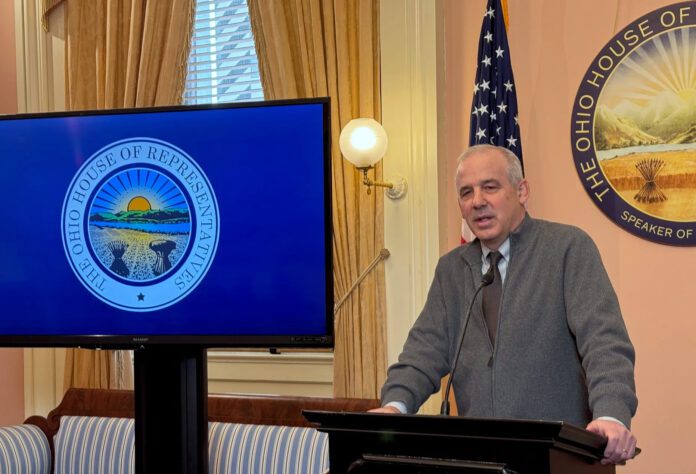This story was originally published by Signal Statewide. Sign up for their free newsletters at SignalOhio.org/StateSignals. Statewide is a media partner of the Toledo Free Press.
By Andrew Tobias | Signal Statehouse

On Tuesday, new House Speaker Matt Huffman made his most expansive public comments since winning one of Ohio’s most powerful jobs earlier this month. He’s foreshadowing state law changes that would make it harder to qualify for Medicaid and easier to get a private-school voucher.
As he settles into the new legislative session, Huffman, a Republican from Lima, touched on those and other topics affecting millions of Ohioans during an 80-minute meeting with reporters on Tuesday. His comments, while short on specifics, were the most extensive he’s made publicly since becoming speaker at the beginning of the month.
As leader of the Ohio House, Huffman holds one of the three most powerful positions in state government. The others are the governor, and the president of the Ohio Senate, a job Huffman held until the end of December, when he left due to term limits.
The new Senate president is Rob McColley, another Northwest Ohio Republican who is Huffman’s political protégée. The two men are expected to work closely in crafting legislation that would be sent to Gov. Mike DeWine for his signature. That’s in sharp contrast to last session, which was complicated by a political rivalry between Huffman and former House Speaker Jason Stephens, whose old leadership job Huffman now has.
Huffman spoke with reporters at the Statehouse as he announced the leaders of dozens of legislative committees who will review proposed law changes. Among the few Republicans not to get a committee position – a job that comes with prestige and a pay bump – was Stephens and a few of his top supporters.
Here’s what Huffman said about Medicaid, school vouchers and a few other high-profile topics.
Medicaid eligibility
Huffman said he supports a move from the DeWine administration to add work requirements to some people enrolled in Medicaid, the healthcare program for the poor and disabled run by the state and federal government. The state has been soliciting public comments on the proposal since last month. State officials have estimated requiring these working-age people to hold a job or enlist in job training to receive Medicaid could affect 62,000 Ohioans. The Center for Community Solutions, a Cleveland-based health policy think tank, estimates the number could be more like 450,000 Ohioans.
The proposal affects those who got Medicaid coverage through Obamacare, which increased the amount of money someone could make and still be eligible. About 3 million Ohioans, or a quarter of the state’s population, currently are enrolled in Medicaid. Enrollment percentages are higher in urban counties and in Appalachia.
DeWine previously sought to impose similar work requirements, but was rejected by President Joe Biden’s administration. Republicans expect incoming president Donald Trump will be more receptive.
Huffman said he doesn’t have a lot of specifics on other changes that could be made to Medicaid. But, he said he believes there are people enrolled in the program who aren’t entitled to benefits. He cited people he believes visit Ohio only occasionally but largely live out of state. He said this view is based on conversations with social service officials in his hometown.
“Frankly, there are people who are on [Medicaid rolls] who we know shouldn’t be on,” Huffman said.
K-12 education, private-school vouchers
Huffman signaled earlier this month that he doesn’t believe public K-12 schools should get the full funding increases envisioned in a landmark 2021 bill that overhauled Ohio’s public-school funding formula. The measure, branded the Fair School Funding Plan, increased the state’s share of school funding by $2 billion, but phases it in over six years.
The final two years of the increase would be in the state’s next two-year budget bill.
But Huffman said Tuesday that the current legislature isn’t bound by the decisions lawmakers made four years ago, and that other elements of the plan dictating how schools were supposed to spend the money weren’t implemented. Previous budgets were approved in a time of greater financial prosperity, including hundreds of millions of dollars the state got thanks to federal coronavirus relief. Lawmakers are expecting the next budget bill to be tighter.
“Every General Assembly has to take into account what is happening when they pass the budget,” Huffman said. “You know, successful businesses and people, for that matter, make long-term financial plans. They don’t plan things one or two years.”
On the other hand, Huffman indicated he doesn’t think potential belt-tightening should affect his long-term goals of expanding eligibility for private-school vouchers, which use state money to pay for kids to go to private schools. The legislature in the last budget bill vastly expanded eligibility for vouchers, costing the state an extra $1 billion.
Huffman said spending to send kids to private school, rather than giving public school districts the extra money, can be a good value to the state. State vouchers cap per-student spending at around an average of $7,000, while the average public-school student costs around $15,000, he said.
“It saves taxpayers money when we implement these programs,” Huffman said.
Unemployment / workers compensation insurance
Ohio is a rare state that runs public insurance programs for workers compensation and unemployment. Employers fund both through premiums they pay into the systems.
Huffman didn’t describe any specific reforms but criticized both programs. He said the unemployment system is a “failed insurance company” that “goes bankrupt” every 10 years or so. He said the state needs to consider the two ways to change its financial picture – either increasing the premiums companies pay or reducing the benefits the program pays out.
“We want people to understand that we’ve got a problem with the unemployment compensation system, and we want to deal with it,” Huffman said.
And he said the workers compensation system collects too much money, as evidenced by the huge rebates it occasionally issues back to employers. He didn’t elaborate on what changes might be made to the program, though.
Marijuana
DeWine last year called for the state to ban Delta 8 products, the so-called “diet weed’ synthetic that contains THC and is available in convenience stores. He and Huffman also want to tweak the recreational marijuana law that voters passed in November 2023.
But both proposals stalled last year in the face of opposition of some House members.
One reason the debate bogged down was disagreement over whether the legislature should ban Delta 8 and change marijuana laws in separate bills, or do it in the same bill.
Huffman said Tuesday he thinks it should happen in the same bill.
Signal Statewide is a nonprofit news organization covering government, education, health, economy and public safety.










